.
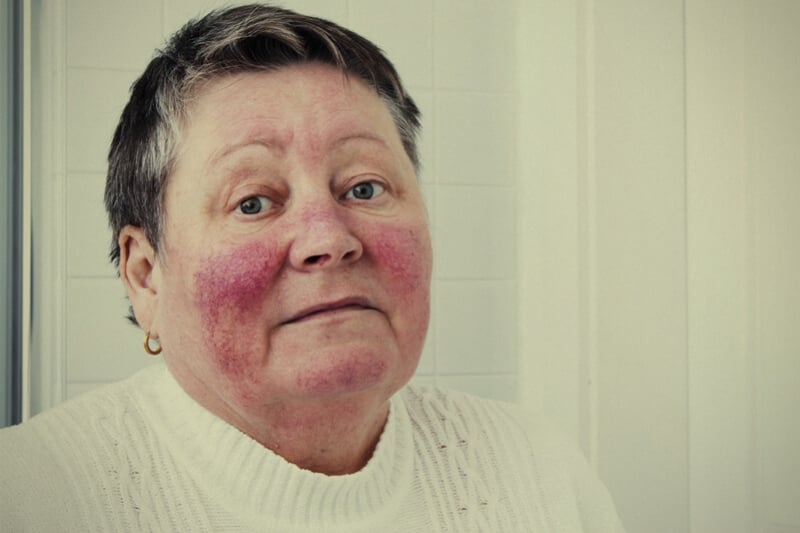
How Could Cannabis and CBD Reduce Symptoms of Rosacea?
Rosacea affects millions of people across the world, causing redness, swelling, dry skin, and even mental health difficulties. While conventional treatments work for some patients, others don't respond well. Now, scientists are prying into cannabis to see if it can help, exploring the potential of THC, CBD, and terpenes. Here's what we know so far.
Contents:
Rosacea doesn’t only affect the skin. The condition also takes a toll on the mind. Many patients experience mental health difficulties associated with negative changes in their appearance. Currently, people with the condition are offered antibiotics, topical gels, and even light therapy. But researchers are on the hunt for more treatment options, and some of them have their eyes on cannabis.
What Is Rosacea?
As a chronic relapsing inflammatory condition that affects the skin, rosacea causes redness, flushing, and irritation. The fluctuating nature of the disease means patients experience revolving periods of exacerbation and remission. Currently, approximately 10% of the population is affected by rosacea, with the highest prevalence among fair-skinned Northern Europeans[1].
No cure currently exists for rosacea. Fortunately, the condition isn’t dangerous, and permanent damage to the skin is rare. However, many patients struggle with the psychosocial implications. Rosacea primarily occurs on the face—an area of the body that we use to communicate both verbally and through physical expression. Facial appearance plays a massive role in a person’s self-esteem, and the recurring presence of redness, bumps, and visible blood vessels can result in fear of judgement and even anxiety and depression[2].
Doctors prescribe a range of treatments to manage the redness and flushing associated with rosacea, including topical gels, courses of antibiotics, and intense pulsed light (IPL) therapy. While these treatments work well for some patients, others are left seeking alternative sources of relief. Researchers are working on finding new ways to manage the condition, and cannabis has garnered interest in this regard.
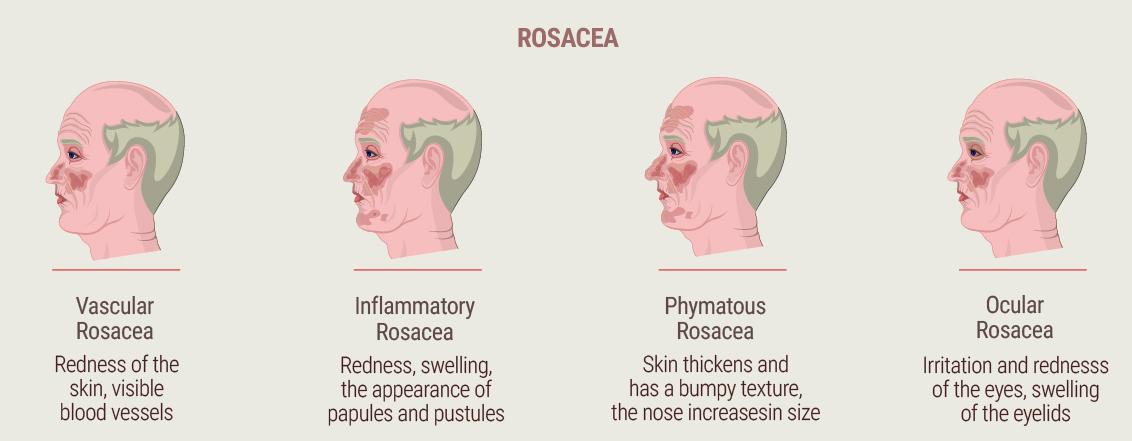
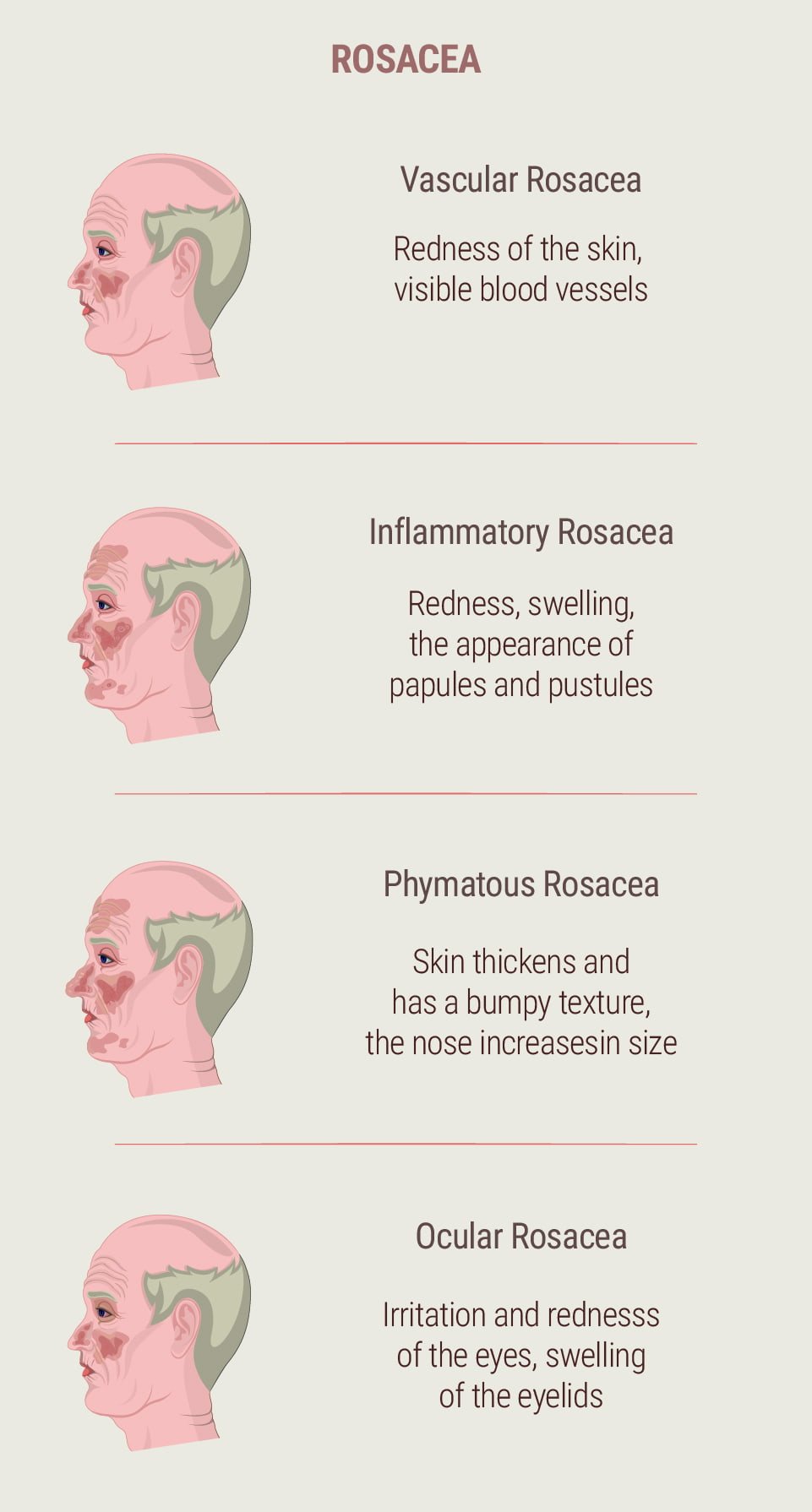
Are Rosacea and Psoriasis Related?
Rosacea and psoriasis are frequently mistaken for one another. Both conditions are chronic and rooted in inflammation, and both manifest as redness and bumps. However, distinct processes underpin each condition, and their symptoms are unique to boot.
Unlike rosacea, which arises from immune and neurovascular dysfunction, psoriasis is an autoimmune disorder that ramps up skin cell proliferation. This causes a buildup of cells that push to the surface, resulting in patches of red, scaly skin and subsequent itching and irritation.
Psoriasis also rears its head at different locations across the skin—it primarily affects the scalp, trunk, elbows, knees, and genitals—whereas rosacea occurs on the face and eyes. Furthermore, flare-ups for each condition are associated with different triggers. You’ll discover the triggers of rosacea below, but those that aggravate psoriasis include infections, stress, cold weather, alcohol, and some prescription medications.
How Rosacea Occurs
The exact cause of rosacea remains unknown, but researchers point to a combination of an overactive immune system, genetics, and environmental factors. Among these, genetics appears to play a governing role, as up to 50% of patients have a family history of the condition.
Contrary to popular belief, the condition doesn’t stem from bad hygiene, and it can’t pass from one person to another in an infectious manner. While the precise molecular mechanisms that underpin rosacea remain unknown, certain triggers[3] are recognised to exacerbate the condition in susceptible individuals. These include:
| Microbes | Ultraviolet (UV) radiation | Nutrition | Extreme temperatures |
| Skin barrier disruption | Psychological stress | Hormone fluctuations |
| Microbes | Ultraviolet (UV) radiation | ||||||
| Nutrition | Extreme temperatures | ||||||
| Skin barrier disruption | Psychological stress | ||||||
| Hormone fluctuations | |||||||
|---|---|---|---|---|---|---|---|
When it comes to nutrition, several foods and drinks are regular culprits. The following are known to frequently cause flare-ups:
| Hot beverages such as tea and coffee | Alcohol | Spices |
| Tomatoes | Citrus fruits | Chocolate |
| Hot beverages such as tea and coffee | Alcohol |
| Spices | Tomatoes |
| Citrus fruits | Chocolate |
As our second-largest organ, the skin plays a key role in human physiology. But it doesn’t exist as an inert barrier separating the inside of the body from the external world. Through a series of complex networks, the skin intertwines with the nervous system, immune system, and endocrine system. Various different cell types are implicated in rosacea, including:
- Keratinocytes: Primary cell type found in the outermost layer of skin; defend against UV rays and pathogens
- Mast cells: Help to direct the immune response; contain chemicals involved in inflammation, such as histamines and cytokines
- Neurons: Nervous system cells that transmit electrical and chemical signals
- Epithelial cells: Another important and protective cell type present in the skin
- Macrophages: Immune cells that detect and destroy pathogens
- Fibroblasts: Secrete collagen and help to build connective tissue
These components contribute to the innate immune system; the non-specific defence system active in the body since birth. Receptors present on some of these cells help to detect threats such as pathogens and physical trauma. Once detected, the innate immune system in the skin launches a chemical attack by secreting antimicrobial peptides (AMPs) such as cytokines and chemokines. These proinflammatory molecules help to fight off invaders, but might also contribute to the symptoms of rosacea when the signalling pathways become disrupted.
Research has found rosacea patients to exhibit higher levels of receptors that detect these threats, as well as higher levels of AMPs associated with angiogenesis (the creation of new blood vessels), which could contribute to symptoms[4] such as redness and flushing. Triggers such as stress, UV radiation, and hormones might also spark this chemical cascade, resulting in flushing, skin sensitivity, itch, and vasodilation (the widening of blood vessels).
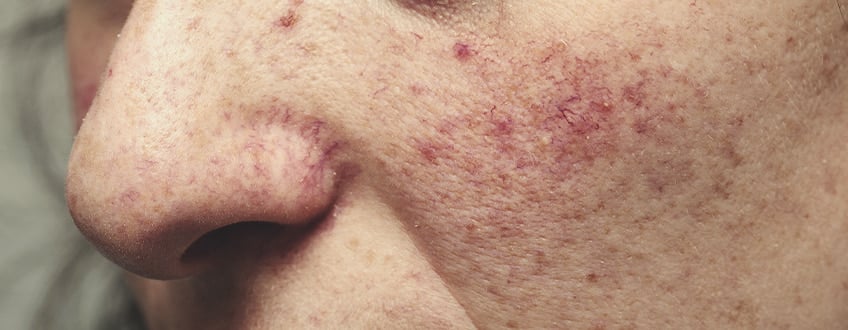
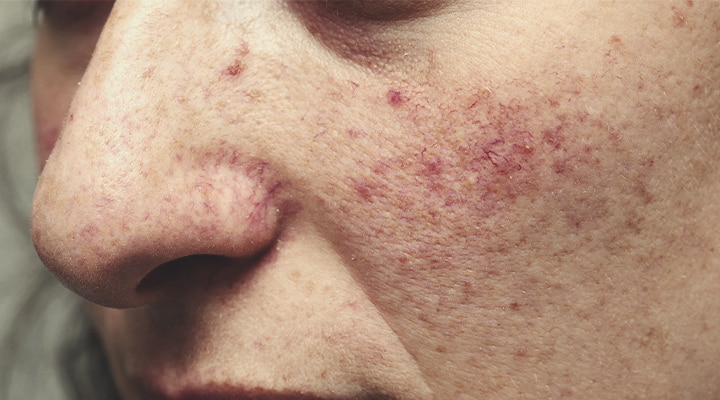
Rosacea Symptoms
The primary symptoms of rosacea include:
- Redness on the nose, cheeks, forehead, and chin
- Burning and stinging sensations when washing the face or using cosmetic products
- Visible blood vessels on the surface of the skin
- Small pink or red bumps
Other symptoms that can develop are:
| Dry skin | Swelling around the eyes | Yellow patches on the skin |
| Thickening of skin on the nose | Sore eyelids | Itching |
| Dry skin | Swelling around the eyes |
| Yellow patches on the skin | Thickening of skin on the nose |
| Sore eyelids | Itching |
Cannabis, the ECS, and Rosacea: Understanding the Potential
So, what could cannabis relate to the symptoms of rosacea? We simply don’t know. No human trials exist that have tested cannabis or cannabis-derived products on people with the condition. However, other studies offer insight into how the herb might affect the disease.
The Emerging Role of the ECS in Skin Disorders
First off, we know that phytochemicals in cannabis, namely cannabinoids, work to encourage homeostasis (balance) in the skin. They do so by interfacing with the endocannabinoid system (ECS). Described as the universal regulator[5] of the human body, the ECS helps many bodily systems maintain this state of equilibrium, from the brain to the bones.
The ECS consists of several key components, including receptors, signalling molecules, and enzymes. Cannabinoids from the cannabis plant manage to bind to these receptors by mimicking signalling molecules produced by the body—a class of chemicals known as endocannabinoids. But not all cannabinoids bind to these sites directly. CBD, for example, only has a minor affinity with them. Instead, it primarily exerts its impact on the ECS by targeting enzymes involved in endocannabinoid production.
How do we know the ECS plays an important part in the skin? Researchers detected components of the system in skin cells, discovering that the ECS plays an important role[6] in cell proliferation, growth, and hormone production. When the ECS functions as it should, it helps to keep processes in the skin running smoothly.
As such, researchers are finding that dysregulation of the ECS plays a role in numerous skin conditions, including atopic dermatitis, psoriasis, scleroderma, and skin cancer. Cannabinoids offer a potential means of influencing this system[7], but to what degree is yet unclear.
Cannabis and Rosacea Symptoms
Cannabis may have the potential to soothe the skin in general, but how might it combat symptoms of rosacea? Inflammation plays a key role in the condition, and early research has examined cannabinoids for their potential to quell this physiological process.
A 2013 animal study[8] published in the journal Allergy tested the anti-inflammatory potential of topical THC in a mouse model of atopic dermatitis. The researchers found THC to impact inflammatory molecules released by keratinocytes—those protective skin cells we mentioned above.
Despite THC's ability to bind with both CB1 and CB2 receptors of the ECS, this study found that the cannabinoid managed to achieve its effects independently of these sites. Overall, the researchers concluded that their results indicate further study into cannabinoids as a means of treating inflammatory skin conditions, and rosacea autumns into this category.
Additionally, researchers are looking to see if they can leverage cannabis compounds to help tame itching and red, sensitive skin. A 2020 review[9] published in the Journal of the American Academy of Dermatology explores the relationship between cannabinoids and specific nerve fibres implicated in itch.
The review also documents ongoing studies testing the efficacy of medical cannabis for itch (pruritus) associated with atopic dermatitis, psoriasis, and allergic dermatitis, among other conditions. However, the authors conclude that tightly controlled clinical trials are required to confirm the potential of cannabinoid treatment for pruritus.
Cannabinoids aside, the herb also produces over 200 terpenes. These aromatic molecules are responsible for the smells and tastes of different cultivars, but they also serve as a reservoir of holistic potential. A review from 2011[10] titled “Botanicals and anti-inflammatories: natural ingredients for rosacea” explored the benefits of several plant species for the condition. Several of the active ingredients in these plants also appear in cannabis, including linalool and camphor.
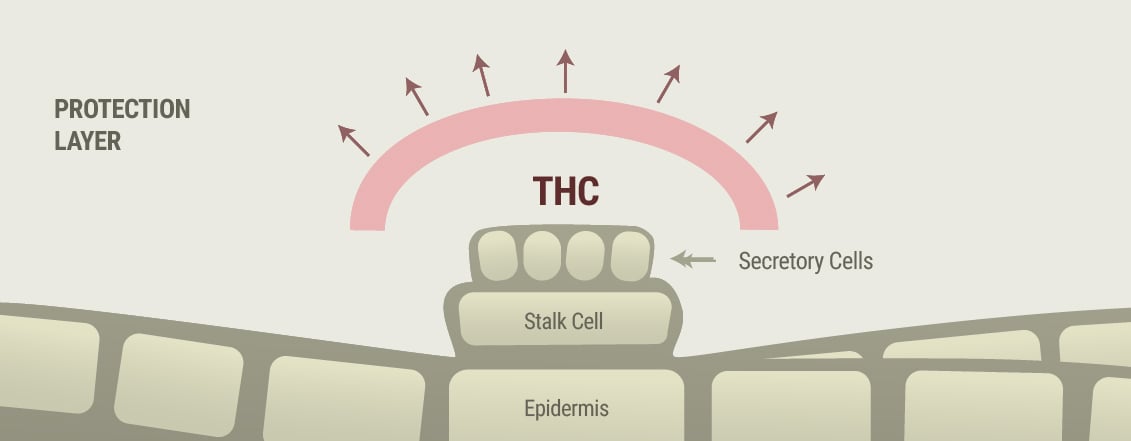
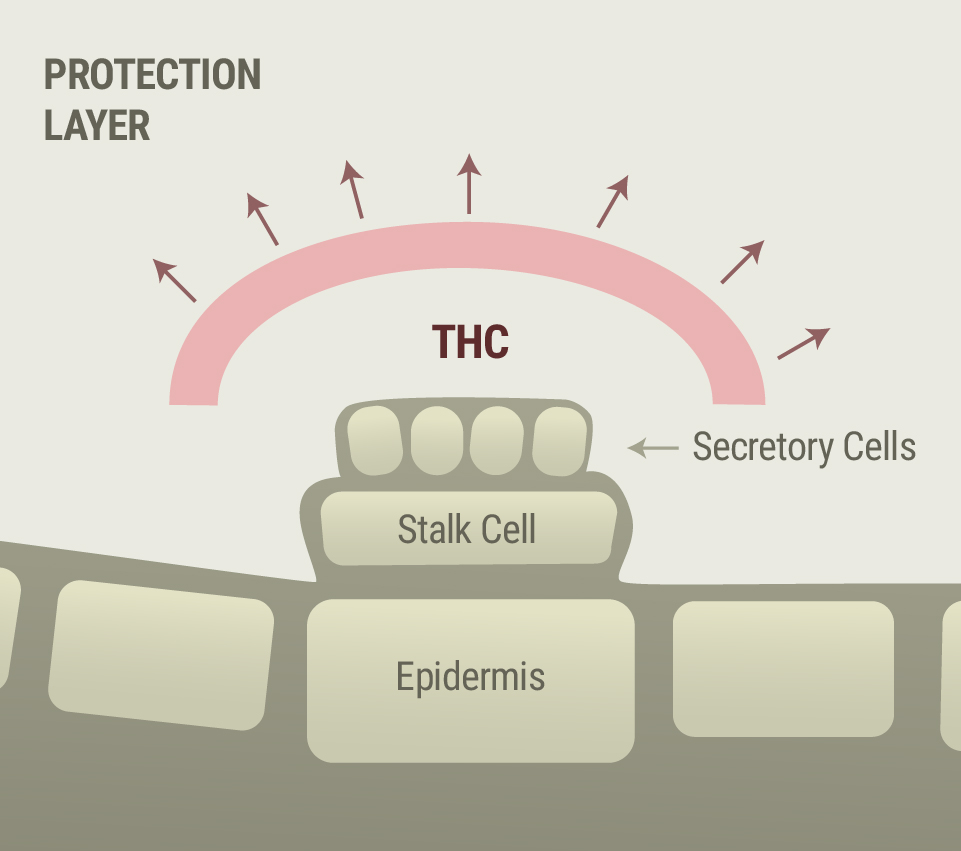
CBD for Rosacea Symptoms
Where does CBD fit into all of this? The non-intoxicating cannabinoid has soaked up the limelight over the past few years, and studies are currently determining the phytochemical’s anti-inflammatory and skin-soothing prowess.
A review[11] published in 2020 in the journal Clinical, Cosmetic and Investigational Dermatology investigated the relationship of CBD with skin health and disorders. The paper touches upon ways in which the cannabinoid could impact the symptoms of inflammatory conditions. For example, the report points to ongoing preclinical studies investigating the antinociceptive (pain stimulus-blocking) potential of CBD in neuropathic and inflammatory pain models.
The research compiled in the review also unveils the role of the CB1 receptor in the itch response. Animal studies show that increasing levels of circulating endocannabinoids reduced itch in mouse models. Interestingly, CBD impacts enzymes of the ECS in a way that temporarily increases endocannabinoid levels. More specifically, it works to inhibit an enzyme[12] known as fatty acid amide hydrolase (FAAH) that is tasked with breaking down the endocannabinoid anandamide, a molecule that binds to CB1.
However, researchers haven’t proved this mechanism in humans, or its efficacy in alleviating the symptoms of skin disorders.
How To Use Cannabis or CBD for Rosacea
Without data from clinical trials, nobody knows exactly how to use CBD for rosacea, or how much to use. Moreover, there are numerous ways to consume or otherwise apply the cannabinoid, including oral, sublingual, inhalation, and topical. In cases of rosacea or other skin conditions, it makes the most sense to opt for topical application, whether that's with regular CBD oil or dedicated skin creams, salves, and lotions.
Applying CBD creams to the skin will introduce the cannabinoid directly to affected cells. Many products on the market also contain other soothing botanicals that help to hydrate and nourish the skin.
Rosacea Won’t Go Away, But Cannabinoids May Help With Symptoms
At this point, it appears that cannabis and its active constituents won’t make rosacea disappear. However, some patients report that topical creams containing cannabinoids and other beneficial ingredients take the edge off. In any case, given the vast and largely untapped potential of cannabinoids and terpenes, researchers are wise to continue probing the cannabis plant in hopes of relieving symptoms of skin conditions such as rosacea.
- Rosacea: Epidemiology, pathogenesis, and treatment https://www.tandfonline.com
- Psychosocial aspects of rosacea with a focus on anxiety and depression https://www.ncbi.nlm.nih.gov
- New insights into rosacea pathophysiology: a review of recent findings - PubMed https://pubmed.ncbi.nlm.nih.gov
- Rosacea as a disease of cathelicidins and skin innate immunity - PubMed https://pubmed.ncbi.nlm.nih.gov
- The Endocannabinoid System, Our Universal Regulator https://www.jyi.org
- The endocannabinoid system of the skin in health and disease: novel perspectives and therapeutic opportunities https://www.sciencedirect.com
- The endocannabinoid system of the skin. A potential approach for the treatment of skin disorders https://www.sciencedirect.com
- Anti-inflammatory activity of topical THC in DNFB-mediated mouse allergic contact dermatitis independent of CB1 and CB2 receptors - PubMed https://pubmed.ncbi.nlm.nih.gov
- Cannabinoids for the treatment of chronic pruritus: A review https://www.sciencedirect.com
- Europe PMC https://europepmc.org
- Therapeutic Potential of Cannabidiol (CBD) for Skin Health and Disorders https://www.ncbi.nlm.nih.gov
- Cannabidiol enhances anandamide signaling and alleviates psychotic symptoms of schizophrenia https://www.ncbi.nlm.nih.gov



































